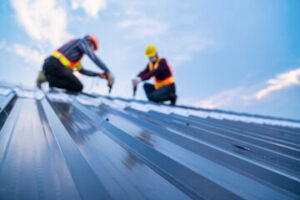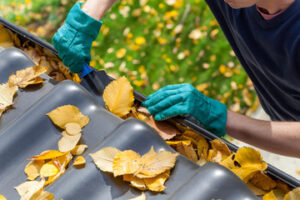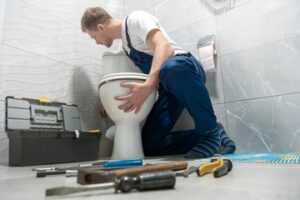Professionals can identify issues that may be overlooked during a visual inspection, such as early material degradation or compromised sealing. This can extend the lifespan of your roof and protect it from future damage.

Experienced professionals are likely to have encountered a variety of roofing problems in the past and have developed effective solutions. This makes them better equipped to handle complex repairs. Contact Roof Repair Expert LLC for professional help.
Professional roof repair experts have a wealth of experience in dealing with a wide variety of roofing problems. Their extensive knowledge enables them to diagnose and address issues promptly. They are also trained to identify underlying problems that may require further inspection or repairs. Choosing the right roof repair experts is critical to ensure the health and integrity of your home or business. When evaluating expert credentials, look for industry certifications and a proven track record of successful projects.
In addition to addressing leaks and ensuring watertightness, experts can help you choose the best roof material for your needs. They can even recommend energy-efficient options that save money on heating and cooling costs. Moreover, they can install solar panels, which can reduce your dependence on fossil fuels.
Another factor to consider when evaluating roof leak repair experts is their level of customer satisfaction. Those who prioritize customer satisfaction are more likely to take prompt action to address issues, thereby providing peace of mind and minimizing property damage. Look for reviews that highlight the quality of services and professionalism of the company, as well as their responsiveness in emergency situations.
During a routine roofing assessment, experienced roofers can detect minor issues that might evolve into a major problem down the line. These experts can identify early warning signs, such as deteriorating sealants or loose shingles. They can also inspect the seams and flashing to determine whether they are properly sealed. This proactive approach to flat roof maintenance can help you avoid costly repairs and extend the lifespan of your roof.
Leaks and other issues can be difficult to pinpoint, but experienced professionals can detect them with advanced technology. They can use moisture meters and infrared cameras to locate trapped water in areas that are not visible to the naked eye. These tools can be used in conjunction with traditional water testing methods to provide comprehensive leak detection capabilities.
A professional roof repair expert will also offer tailored maintenance plans to extend the life of your roof and prevent future problems. These plans can include cleaning, repairing cracks, and sealing flashing. Regular maintenance can reduce the need for repairs and improve your home’s energy efficiency.
Certifications
Roof repair experts are qualified professionals with the necessary knowledge and skills to identify & fix problems. They can also recommend the best roof materials, based on the climate and other factors. Additionally, they can use the latest technology to perform inspections and repairs. They have access to high quality material at wholesale costs, which means you can save money in the long run. They can repair cracks & punctures and patch up leaky areas to prevent further damage and water incursion. They can even help you get rid of pests, debris and moss from your roof.
Roof leaks can be hard to detect, but an experienced roofer can locate them using professional tools such as moisture meters and infrared cameras. They can also pinpoint hidden moisture accumulation and track it to its source, preventing costly interior damage.
Preventive maintenance is the best way to reduce the likelihood of leaks and extend your flat roof’s lifespan. Regular inspections by certified roofers can identify early warning signs, such as compromised sealants & deteriorated flashing. They can also check for clogged drains and ensure water can flow off your roof properly. To become certified, roofing professionals must pass an exam and meet certain requirements. These include industry-related education and experience, high ethical standards, and successful completion of a four-day advanced classroom course.
Customer reviews
A healthy roof is important for the safety and value of your home. It protects the interior from moisture and pests, keeps water draining properly, and prevents leaks and structural damage. Regular inspections by a roof repair expert help detect problems before they cause serious damage and reduce the likelihood of costly repairs down the road. They also have access to high quality materials at wholesale costs compared to what you might find at your local home change store.
Warranty
A warranty is a powerful selling point, and an excellent way to distinguish your roofing company from competitors. It demonstrates a company’s commitment to quality and customer satisfaction. A solid warranty program also helps build loyalty, fostering long-term customer relationships. However, you should carefully review the warranty’s fine print to understand exactly what it covers. For example, a manufacturer warranty may not cover repairs if they’re caused by improper maintenance or installation. A homeowner’s insurance policy is more likely to cover such issues.
Choosing the best roof leak repair experts is crucial to the safety and comfort of your home. Whether you’re in need of a simple leak repair or a complete roofing replacement, these professionals will ensure that the job is done right the first time. They’ll also help you navigate the complexities of an insurance claim and maximize your coverage benefits.
In addition to industry certifications, you should look for a roofing contractor with a valid license and liability insurance. This will ensure that they are qualified and insured to perform roofing work, and that you are protected in the event of an accident or injury on the job.
Leak repair experts who prioritize rapid response and are available to address emergency roofing issues play a crucial role in preventing further damage and minimizing the cost of repairs. This service is especially important in the case of water leaks, as they can cause significant structural damage to the interior and exterior of your property if left unattended for too long.
A comprehensive and detailed warranty can be a great selling point for a roofing company, but it’s important to understand what is covered. Many warranties include fine print that excludes certain types of damage, such as hurricane or hail damage. Additionally, some warranties only cover the original installation of the roof and do not cover subsequent alterations or repairs.
In addition to roofing repairs, a top-notch roofing company will offer comprehensive services for all of your home’s systems. These can include air conditioning, heating, plumbing, and electrical systems. This allows you to save money by reducing your energy consumption and avoiding costly repairs in the future.




